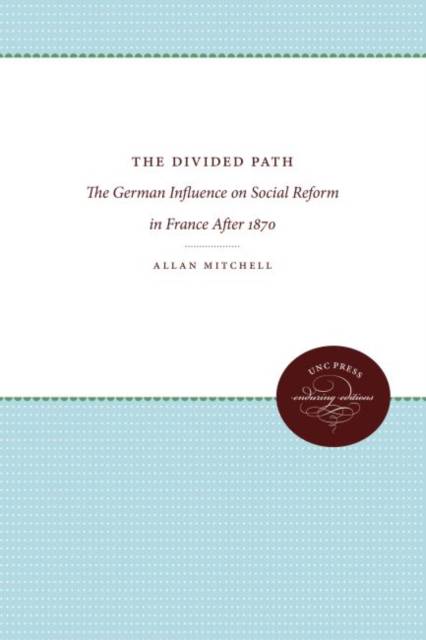
En raison d'une grêve chez bpost, votre commande pourrait être retardée. Vous avez besoin d’un livre rapidement ? Nos magasins vous accueillent à bras ouverts !
- Retrait gratuit dans votre magasin Club
- 7.000.000 titres dans notre catalogue
- Payer en toute sécurité
- Toujours un magasin près de chez vous
En raison de la grêve chez bpost, votre commande pourrait être retardée. Vous avez besoin d’un livre rapidement ? Nos magasins vous accueillent à bras ouverts !
- Retrait gratuit dans votre magasin Club
- 7.000.0000 titres dans notre catalogue
- Payer en toute sécurité
- Toujours un magasin près de chez vous
The Divided Path
The German Influence on Social Reform in France After 1870
Allan Mitchell
Livre broché | Anglais
91,95 €
+ 183 points
Description
With The Divided Path, Allan Mitchell completes his superb trilogy on the German influence in France between the wars of 1870 and 1914. Mitchell's focus here is on the French response to the pathbreaking social legislation passed during the 1880s in imperial Germany under Otto von Bismarck. Operating under a liberal republican regime, France tended to reject the interventionist policies of its imposing neighbor and to seek a distinctly French solution to the many social problems that became more pressing as the nineteenth century reached its climax in the First World War.
Mitchell's carefully researched study investigates a number of specific issues that remain of direct relevance today, such as gender relationships, health care (including the treatments and prevention of infectious disease), labor conflicts, taxation policy, social security measures, and international tensions on the eve of a major war. He shows that certain key problems of public health and welfare found different solutions in France and Germany, and he explains why the differences emerged and how they defined the two major competitors of continental Europe. The nineteenth-century epidemic of tuberculosis provides a case in point: the German state intervened to combat the dreaded disease with vigorous measures of public hygiene and popular sanatoria, but the French republic moved more cautiously to limit interference in the private sphere, even though laissez faire often meant laissez mourir.
Mitchell's book is the first full-scale study of French social reform after 1870 that is based on documentation in both France and Germany. The first hesitant steps of the French welfare state are thrown into sharp relief by comparison with developments in Germany. No other work on modern France presents such a broad panorama of social reform, and none draws together such a rich tableau of telling detail about the development of the French health and welfare system after 1870.
In a lucid conclusion, Mitchell places this story in the general context of his three volumes, thereby offering a summary of the Franco-German encounter that has come to dominate the history of Europe in the twentieth century.
Originally published in 1991.
A UNC Press Enduring Edition -- UNC Press Enduring Editions use the latest in digital technology to make available again books from our distinguished backlist that were previously out of print. These editions are published unaltered from the original, and are presented in affordable paperback formats, bringing readers both historical and cultural value.
Mitchell's carefully researched study investigates a number of specific issues that remain of direct relevance today, such as gender relationships, health care (including the treatments and prevention of infectious disease), labor conflicts, taxation policy, social security measures, and international tensions on the eve of a major war. He shows that certain key problems of public health and welfare found different solutions in France and Germany, and he explains why the differences emerged and how they defined the two major competitors of continental Europe. The nineteenth-century epidemic of tuberculosis provides a case in point: the German state intervened to combat the dreaded disease with vigorous measures of public hygiene and popular sanatoria, but the French republic moved more cautiously to limit interference in the private sphere, even though laissez faire often meant laissez mourir.
Mitchell's book is the first full-scale study of French social reform after 1870 that is based on documentation in both France and Germany. The first hesitant steps of the French welfare state are thrown into sharp relief by comparison with developments in Germany. No other work on modern France presents such a broad panorama of social reform, and none draws together such a rich tableau of telling detail about the development of the French health and welfare system after 1870.
In a lucid conclusion, Mitchell places this story in the general context of his three volumes, thereby offering a summary of the Franco-German encounter that has come to dominate the history of Europe in the twentieth century.
Originally published in 1991.
A UNC Press Enduring Edition -- UNC Press Enduring Editions use the latest in digital technology to make available again books from our distinguished backlist that were previously out of print. These editions are published unaltered from the original, and are presented in affordable paperback formats, bringing readers both historical and cultural value.
Spécifications
Parties prenantes
- Auteur(s) :
- Editeur:
Contenu
- Nombre de pages :
- 432
- Langue:
- Anglais
Caractéristiques
- EAN:
- 9780807857434
- Date de parution :
- 01-09-10
- Format:
- Livre broché
- Format numérique:
- Trade paperback (VS)
- Dimensions :
- 152 mm x 229 mm
- Poids :
- 630 g

Les avis
Nous publions uniquement les avis qui respectent les conditions requises. Consultez nos conditions pour les avis.






